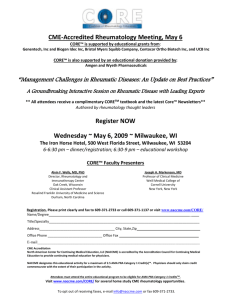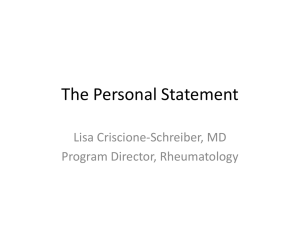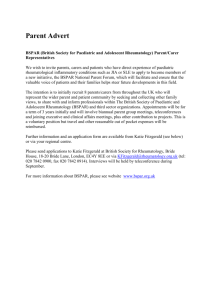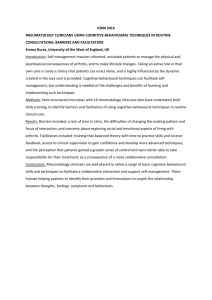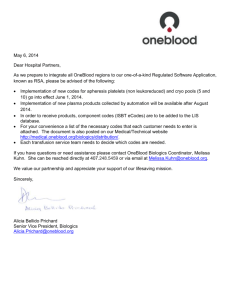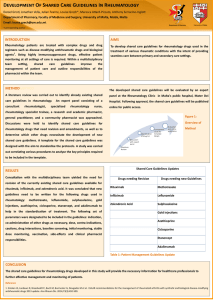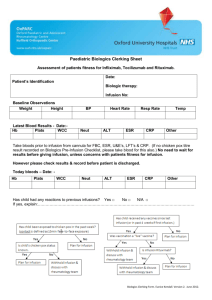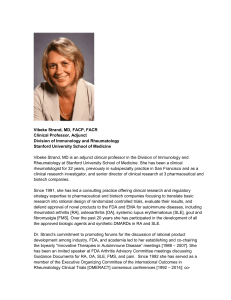A FRAMEWORK FOR A REGISTER OF BIOLOGICAL AGENTS IN RHEUMATOLOGY
advertisement
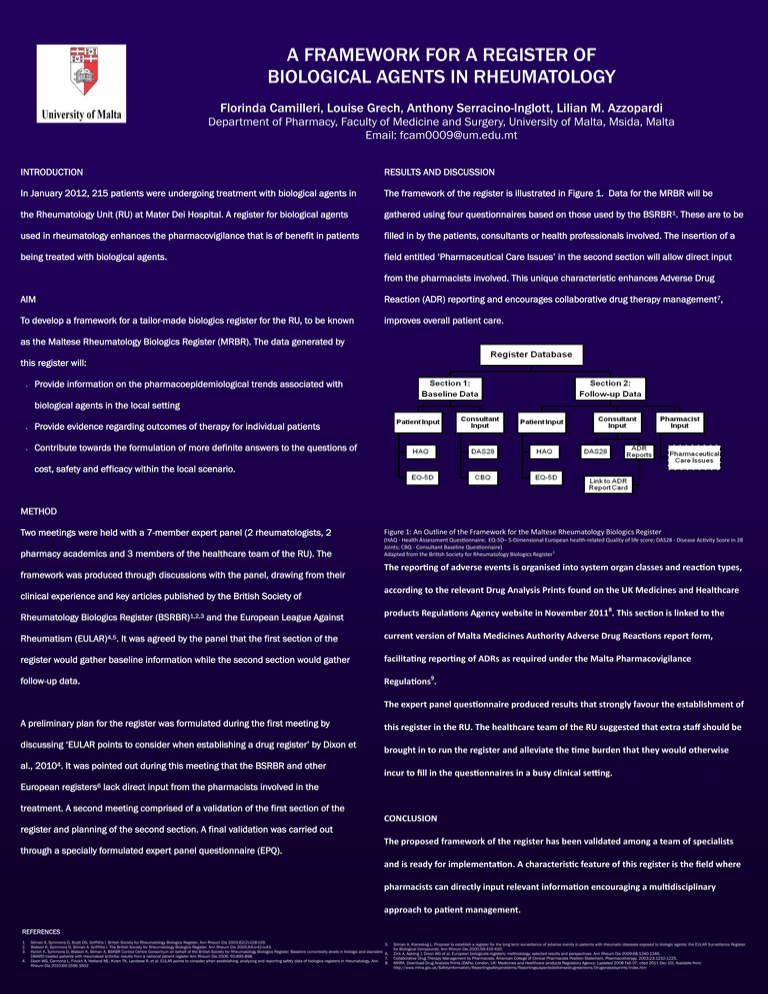
A FRAMEWORK FOR A REGISTER OF BIOLOGICAL AGENTS IN RHEUMATOLOGY Florinda Camilleri, Louise Grech, Anthony Serracino-Inglott, Lilian M. Azzopardi Department of Pharmacy, Faculty of Medicine and Surgery, University of Malta, Msida, Malta Email: fcam0009@um.edu.mt INTRODUCTION RESULTS AND DISCUSSION In January 2012, 215 patients were undergoing treatment with biological agents in The framework of the register is illustrated in Figure 1. Data for the MRBR will be the Rheumatology Unit (RU) at Mater Dei Hospital. A register for biological agents gathered using four questionnaires based on those used by the BSRBR1. These are to be used in rheumatology enhances the pharmacovigilance that is of benefit in patients filled in by the patients, consultants or health professionals involved. The insertion of a being treated with biological agents. field entitled ‘Pharmaceutical Care Issues’ in the second section will allow direct input from the pharmacists involved. This unique characteristic enhances Adverse Drug AIM Reaction (ADR) reporting and encourages collaborative drug therapy management7, To develop a framework for a tailor-made biologics register for the RU, to be known improves overall patient care. as the Maltese Rheumatology Biologics Register (MRBR). The data generated by this register will: Provide information on the pharmacoepidemiological trends associated with biological agents in the local setting Provide evidence regarding outcomes of therapy for individual patients Contribute towards the formulation of more definite answers to the questions of cost, safety and efficacy within the local scenario. METHOD Two meetings were held with a 7-member expert panel (2 rheumatologists, 2 Figure 1: An Outline of the Framework for the Maltese Rheumatology Biologics Register pharmacy academics and 3 members of the healthcare team of the RU). The (HAQ - Health Assessment Questionnaire; EQ-5D– 5-Dimensional European health-related Quality of life score; DAS28 - Disease Activiity Score in 28 Joints; CBQ - Consultant Baseline Questionnaire) Adapted from the British Society for Rheumatology Biologics Register1 framework was produced through discussions with the panel, drawing from their clinical experience and key articles published by the British Society of The reporting of adverse events is organised into system organ classes and reaction types, according to the relevant Drug Analysis Prints found on the UK Medicines and Healthcare Rheumatology Biologics Register (BSRBR)1,2,3 and the European League Against products Regulations Agency website in November 20118. This section is linked to the Rheumatism (EULAR)4,5. It was agreed by the panel that the first section of the current version of Malta Medicines Authority Adverse Drug Reactions report form, register would gather baseline information while the second section would gather facilitating reporting of ADRs as required under the Malta Pharmacovigilance follow-up data. 9 Regulations . The expert panel questionnaire produced results that strongly favour the establishment of A preliminary plan for the register was formulated during the first meeting by discussing ‘EULAR points to consider when establishing a drug register’ by Dixon et al., 20104. It was pointed out during this meeting that the BSRBR and other this register in the RU. The healthcare team of the RU suggested that extra staff should be brought in to run the register and alleviate the time burden that they would otherwise incur to fill in the questionnaires in a busy clinical setting. European registers6 lack direct input from the pharmacists involved in the treatment. A second meeting comprised of a validation of the first section of the CONCLUSION register and planning of the second section. A final validation was carried out through a specially formulated expert panel questionnaire (EPQ). The proposed framework of the register has been validated among a team of specialists and is ready for implementation. A characteristic feature of this register is the field where pharmacists can directly input relevant information encouraging a multidisciplinary approach to patient management. REFERENCES 1. 2. 3. 4. Silman A, Symmons D, Scott DG, Griffiths I. British Society for Rheumatology Biologics Register. Ann Rheum Dis 2003;62(2):ii28-ii29. Watson K, Symmons D, Silman A, Griffiths I. The British Society for Rheumatology Biologics Register. Ann Rheum Dis 2005;64:iv42-iv43. Hyrich K, Symmons D, Watson K, Silman A, BSRBR Control Centre Consortium on behalf of the British Society for Rheumatology Biologics Register. Baseline comorbidity levels in biologic and standard DMARD treated patients with rheumatoid arthritis: results from a national patient register Ann Rheum Dis 2006; 65:895-898. Dixon WG, Carmona L, Finckh A, Hetland ML, Kvien TK, Landewe R, et al. EULAR points to consider when establishing, analyzing and reporting safety data of biologics registers in rheumatology. Ann Rheum Dis 2010;69:1596-1602 5. 6. 7. 8. Silman A, Klareskog L. Proposal to establish a register for the long term surveillance of adverse events in patients with rheumatic diseases exposed to biologic agents: the EULAR Surveillance Register for Biological Compounds. Ann Rheum Dis 2000;59:419-420. Zink A, Askling J, Dixon WG et al. European biologicals registers: methodology, selected results and perspectives. Ann Rheum Dis 2009;68:1240-1246. Collaborative Drug Therapy Management by Pharmacists. American College of Clinical Pharmacists Position Statement. Pharmacotherapy. 2003;23:1210-1225. MHRA. Download Drug Analysis Prints (DAPs). London, UK: Medicines and Healthcare products Regulatory Agency; [updated 2008 Feb 07; cited 2011 Dec 10]. Available from: http://www.mhra.gov.uk/Safetyinformation/Reportingsafetyproblems/Reportingsuspectedadversedrugreactions/Druganalysisprints/index.htm
